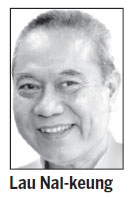HK lawyers cannot wish away authority of the NPCSC
Updated: 2012-10-16 06:47
By Lau Nai-keung(HK Edition)
|
|||||||

Some political controversies are just tempests in a teacup. The controversy over Elsie Leung Oi-sie's recent remarks is a tempest in an empty teacup. Leung gave a talk entitled "The Legal Challenges since the Handover" on Oct 6 under the auspices of the Institute of Social Science of the Hong Kong College of Technology. She was reported to have made express references to the Ng Ka-ling judgment of the Court of Final Appeal in 1999 and said that the legal profession in Hong Kong, including judges, had a poor understanding of and misunderstood the central government-HKSAR relationship. She was also reported to have said that if the judges had the correct and necessary understanding, mistakes would not have been made.
According to news reports, Leung also said that in relation to the issue of "Doubly Non-permanent Mainland Women" giving birth in Hong Kong, her preferred solution was for the Chief Executive of the HKSAR to report to the State Council for the purpose of seeking an interpretation of the Basic Law by the National People's Congress Standing Committee (NPCSC).
I have copied the two paragraphs above almost word for word from the Hong Kong Bar Association's (HKBA) statement issued on Oct 10 so that we do not have to argue about the "facts of the case". Let's talk about principles and look at their complaints.
While admitting that "Courts of the HKSAR have consistently acknowledged (the) power of the NPCSC to interpret provisions of the Basic Law in accordance with the Basic Law," the Bar Association emphasized: "It is a cardinal principle of the common law that the interpretation of all enacted laws is a matter solely for the judges when deciding cases litigated before them."
The Bar Association's statement went on: "It is well-established that the interpretation of the Basic Law in the HKSAR is a task entrusted by the Basic Law to the courts of the HKSAR and to be exercised independently. The HKBA reiterates that judicial independence is an indispensable and most important facet of the application and adherence of the rule of law in Hong Kong."
The Law Society issued a similar statement on the same day, noting that "under the Basic Law, Hong Kong courts are authorized by the NPCSC to interpret on their own, in adjudicating cases, the provisions of the Basic Law which are within the limits of autonomy of Hong Kong."
The key point here, of course, is "in adjudicating cases". Are our courts now adjudicating any cases concerning "Doubly Non-permanent Mainland Women" giving birth in Hong Kong? No.
Can the HKSAR government seek NPCSC interpretation of the Basic Law without a particular case being heard? Yes, it can. And it did in 2005 regarding the term of the new Chief Executive after the then Chief Executive resigned.
Leung is deputy chairperson of the Committee for the Basic Law of the HKSAR. The committee is set up under the NPCSC - its role being to advise the NPCSC on matters such as whether there's a need to interpret the Basic Law. With due consultation with the Basic Law Committee, the NPCSC interpreted the Basic Law on its own initiative on two occasions - in February 1997 on the legality of 24 colonial ordinances, and in 2004, on universal suffrage for the city in 2007 and 2008. Both instances involved no cases being adjudicated. In fact, we should applaud Leung for making public her stance towards the matter. This is called transparency, allegedly a "universal value".
If our courts are adjudicating a case on children given birth by "Doubly Non-permanent Mainland Women", according to Article 158 of the Basic Law, they have to seek an interpretation from the NPCSC "before making their final judgments which are not appealable" as the issue definitely concerns "affairs which are the responsibility of the Central People's Government, or concerning the relationship between the Central Authorities and the Region".
When no cases are being adjudicated, the NPCSC can interpret the Basic Law on its own initiative. To say that an interpretation from the NPCSC would "likely damage the rule of law in Hong Kong" is not only a direct challenge to the NPCSC's authority, it's also disrespect to the HKSAR's courts, which have "consistently acknowledged the power of the NPCSC to interpret provisions of the Basic Law in accordance with the Basic Law".
The author is a member of the Commission on Strategic Development.
(HK Edition 10/16/2012 page3)